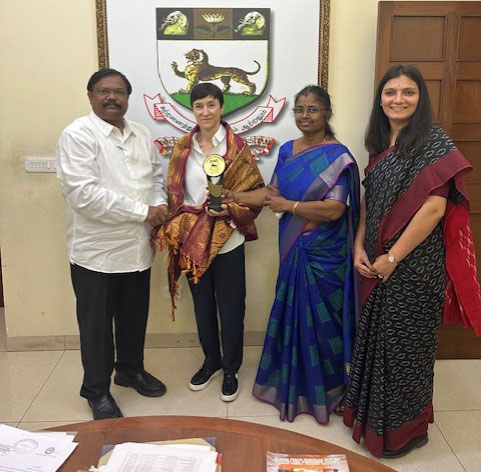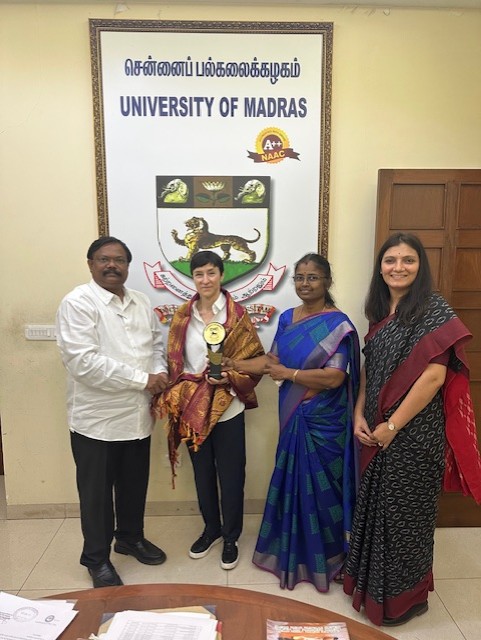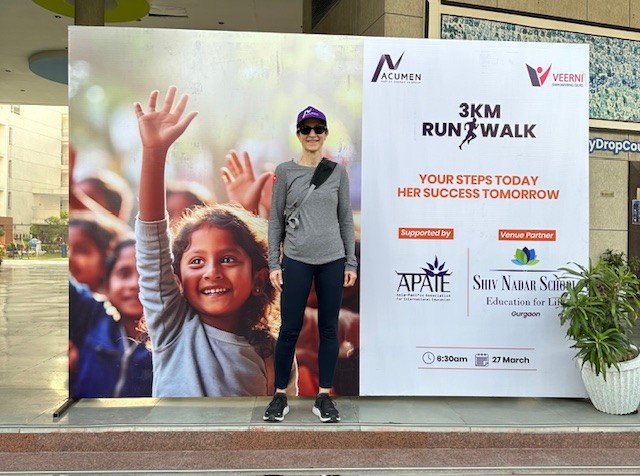
Building Trust in International Education
Takeaways From the APAIE Conference in India
As many in the field are aware, India is hugely important in the international education sphere. With its dynamic higher education landscape, growing student mobility, and expanding transnational partnerships, it remains a key region for engagement and collaboration. In order to better understand the environment, meet with partners and potential partners, and attend the Asia-Pacific Association for International Education (APAIE) conference, I took a trip there earlier this year.
Trust Through Engagement
In our capacity as credential evaluators, India provides us with endless opportunities to do research, apply methodology, and discuss various approaches. On this trip, I was wearing not only my ECE hat, but also more broadly representing TAICEP’s Digital Student Data subcommittee, and the Groningen Declaration Network (GDN). I believe that we need to promote the digitization of student records, and encourage institutions and examination boards to share student records digitally, allowing the learner autonomy in sharing their educational achievements.
Like other credential evaluators, ECE receives Indian documents in many formats—paper, emailed by the institution, and shared by a third-party verification service, among others. All of these methods have advantages and drawbacks, so one of the goals in the conversations with registrars and controllers of examinations at institutions was to develop relationships so that we receive documents electronically, directly from them.
Often when I describe the challenges of documentation in our profession, I talk about the ideas of “chain of custody” and trust. In some ways, educational documents are like artwork—if you don’t know the provenance, you can’t trust the authenticity. For many years, we’ve trusted that documents sent directly to us by the issuing institution are authentic. However, we have all seen falsified documents sent in sealed envelopes. Other, original paper documents that have been issued to the student may have safety features, but the provenance of the document is harder to confirm. For many third-party authenticators, the trust lies in our vetting the organizations and validating that they’re doing what they say they’re doing—contacting the issuing institution (or extracting from the national database) and confirming the contents of the academic record sent on to the evaluator. Even with documents supposedly emailed directly from the issuing institution, there are ways for falsified documents to be submitted, and email addresses spoofed. My meetings in India were focused on these issues – to develop and solidify relationships with institutions and to reinforce the confidence in third-party partners.
Global Conversations
I was fortunate that my trip took me to several regions of the country—from Mumbai and Pune in Maharashtra to Kochi and Kottayam in Kerala and Chennai in Tamil Nadu. Before attending the APAIE conference in Delhi, I also visited partners in the area and spent a morning with colleagues at the Central Board of Secondary Education, who were generous with their time despite being in the middle of exam season.
Highlights of the conference were sessions discussing support for refugee students; updates on education in Bhutan, Nepal, Singapore, Thailand, and Indonesia; the transnational education “revolution;” and, of course, education in India. Always a hot topic, there was a lot of good information about the growth of TNE in India; interestingly “franchising” is not currently allowed in India, which impacts the TNE possibilities there.

A particularly timely session was about the relationship between the National Education Policy (NEP 2020) and internationalization. The Indian government is encouraging internationalization—seeking more incoming students rather than just outgoing, and every HEI will be required to have an international office. According to the Ministry of Foreign Affairs there were over 1.3 million Indian students studying abroad in 2024, but the results of the 2022 Indian Ministry of Education All India Survey on Higher Education show that only about 47,000 foreign students, from 170 countries, were studying in Indian institutions. This number has likely increased in the past few years, but is still miniscule compared to the outgoing numbers.
Another highlight of the week in Delhi was a visit to the Shiv Nadar School for a 3k run/walk in support of the Veerni Literacy Program. Two busloads of APAIE attendees walked or ran around the school, with Acumen donating to the cause of female literacy for each participant.

After a final few days in Delhi, I headed to Leiden in the Netherlands to join colleagues from universities and international schools at the 2025 Council of International Schools (CIS) Summit of University and School Leaders. The strands this year were “Broadening Assessment and Skills Recognition” and “Supporting Student Transitions to Higher Education.” Beyond the set agenda focusing on Melbourne Metrics and new thinking surrounding student success, there was ample time for sharing blue-sky ideas and cross-sector work between schools and universities.
Continuing our Commitment
As we look for ways to support, grow, and advocate for international education, events like the APAIE conference and CIS Summit are particularly rewarding, both personally and professionally. In formal and informal gatherings, professionals from different areas of international education came together, bringing their own ideas and perspectives to creatively find solutions and responses to the challenges facing our field. I came back reinspired to support ECE’s mission to ensure that educational qualifications are fairly and accurately recognized across borders.
Author: Margaret Wenger, Senior Director of Information and Knowledge